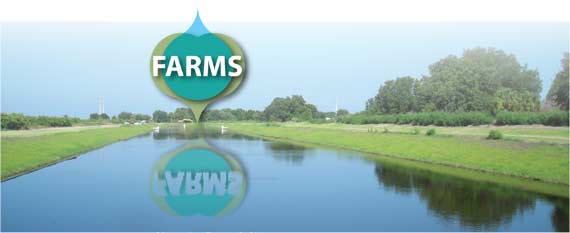
At a time when most news reports about the economy are negative, a District program is providing a boon to the local economy.
A project funded through the District’s Facilitating Agricultural Resource Management Systems (FARMS) Program, a cost-share reimbursement program that conserves water and improves water quality, created work for ten local contractors and subcontractors.
The project involved the design, permitting and construction of a five-acre surface water and tailwater recovery pond and pump station in Claude Melli’s citrus grove in DeSoto County. The goal of the project is to reuse irrigation water from the groves and provide a source to pump from during the cold weather to protect the trees. Using surface water will reduce groundwater pumping in the District’s Southern Water Use Caution Area while also improving water quality in the Joshua Creek watershed.
One of the local companies involved in the project is Progressive Water Resources (PWR), which designed the system and assisted the contractors involved in its construction.
“The goal was to design a feature that would provide a sustainable and much-needed source of water while minimizing the impact to Mr. Melli’s groves,” said David Brown, PWR principal and managing partner.
The long, thin design does not take up a lot of space in the grove while providing tailwater recovery for more than 300 acres of citrus, or about one-fourth of Melli’s grove. Several major ditches in the grove drain into the pond, which holds up to 15 million gallons of water. The pump station will be completed soon and will tie the project into the existing irrigation system.
Don Wilson owns the excavating and utility company that won the bid for the project. “With no development going on, this job allowed me to keep my doors open.”
Wilson has been in business for 37 years and was out at the site daily to make sure the job was done correctly. About a dozen of his staff worked on the project, and he knew that a job done well could lead to more work in the future.
In addition to Wilson’s company, several other local businesses were employed on this project, including an irrigation contractor and a nearby sod company that uses surface water provided by another FARMS project.
“The economic impact of this project does not stop with the contractors,” said Eric DeHaven, the District’s resource data and restoration director. “This project will help improve the growers’ economy as well because the improved water quality will lead to an increase in fruit quantity and quality.”
This is the second FARMS project at the grove. Melli looked to the District for help due to his problems with mineralized ground water and an inability to pump enough water for cold protection. When a tree is damaged by a freeze, it takes a year for it to recover.
“We lost several million dollars before we started working with the District,” said Melli. “Production was down to 80 to 100 boxes of fruit per acre, but now we are back up to 400 to 500 boxes.”
The District’s well back-plugging program helped reduce the salinity in Mr. Melli’s wells. However, back-plugging the wells meant less water was being pumped, which placed a greater importance on a sustainable surface water supply.
The first FARMS project began to address the quantity problems and involved installing pumps, filters and piping to connect an existing stormwater reservoir to the irrigation system. It was projected to offset 170,000 gallons per day (gpd) and is functioning close to those projections. However, the first project does not work well during the dry season due to the shallowness of the reservoir and its limited storage. The new FARMS project is gravity-fed and can be used year-round. It is expected to offset 92,000 gpd, if not more.
Melli is now a huge proponent of the FARMS Program and talks to other growers about how the program can help them solve water quality and quantity problems.
Brown also brings other growers to see the projects and learn what they can do on their own farms.
“Farmers can be skeptical, and rightly so,” said Brown. “So before they move forward on a project, they really want to see results. Once they see a project such as this one, they become more interested in working with the District.”
For more information about the District’s FARMS Program, please visit the District’s web site at WaterMatters.org/farms or call the District’s Sarasota Service Office at (941) 377-3722 or 1-800-320-3503 (FL only), ext. 6529.
